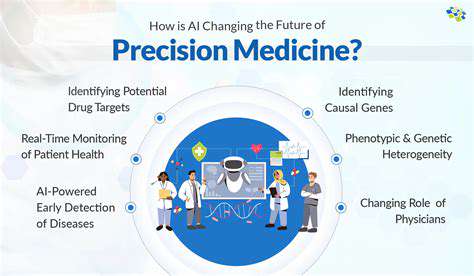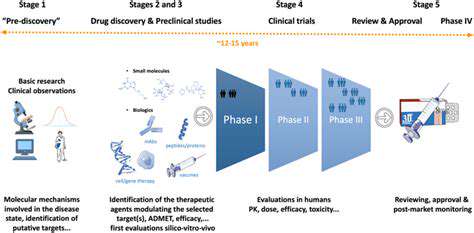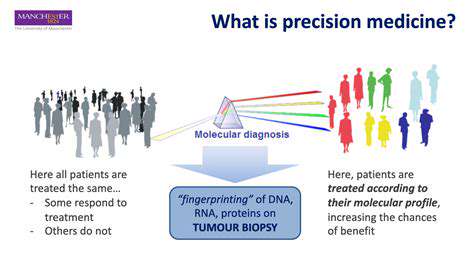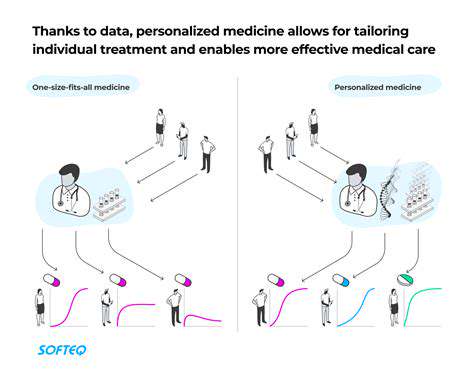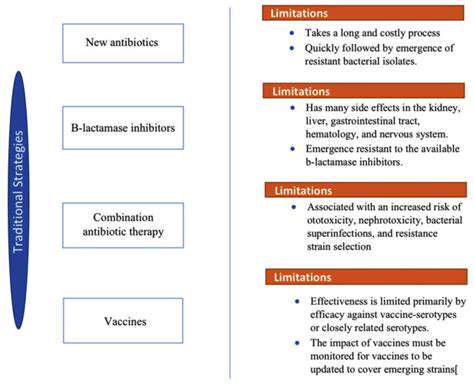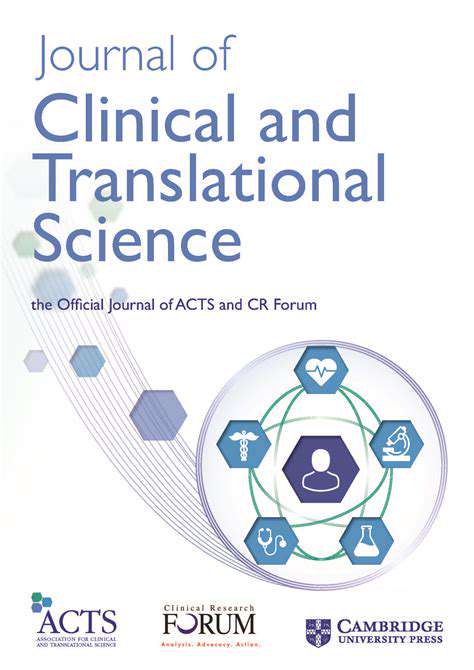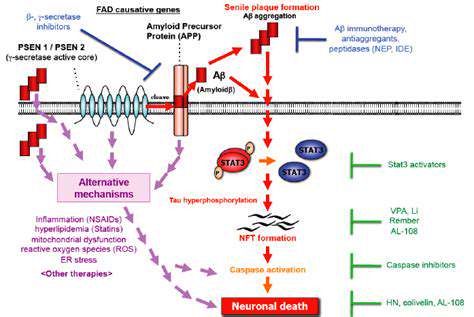
Targeting the Amyloid Cascade Hypothesis in Alzheimer's Disease
The amyloid cascade hypothesis suggests that amyloid-beta (Aβ) buildup in the brain is the main driver of Alzheimer's. This theory proposes that plaque formation leads to tau tangles, brain cell loss, and cognitive decline. Understanding this process is essential for developing effective treatments.
Many studies have examined different parts of this cascade to find potential treatment targets. Researchers have focused on both reducing Aβ production and improving its removal from the brain.
Aβ Production and Clearance
The amyloid hypothesis centers on the idea that abnormal Aβ production or poor clearance leads to buildup. This accumulation is thought to trigger events that ultimately cause brain cell damage and cognitive problems.
Scientists have studied various factors involved in Aβ production, including enzymes that process amyloid precursor protein. They've also examined clearance mechanisms involving immune cells and brain fluid drainage.
Therapeutic Strategies Targeting Aβ
Many treatment approaches target Aβ, focusing on reducing its production or enhancing removal. These range from modifying processing enzymes to boosting clearance mechanisms.
One major research area involves developing drugs that block enzymes involved in Aβ production. Another important focus is finding ways to remove existing plaques, including stimulating immune cells and improving brain fluid drainage.
Role of Other Molecular Players
While the amyloid hypothesis emphasizes Aβ, other factors like tau proteins and inflammation also contribute significantly. The complex interactions between Aβ and these other factors need further study.
Current research explores how tau pathology, inflammation, and oxidative stress work with Aβ buildup to drive Alzheimer's progression. A comprehensive understanding of these interactions is crucial for developing better treatments.
Challenges and Limitations of the Hypothesis
Despite its importance, the amyloid hypothesis has limitations. Clinical trials targeting Aβ have shown mixed results, with some demonstrating limited effectiveness or side effects.
These challenges highlight the need for a more complete understanding of Alzheimer's. The disease's complexity suggests that targeting just one pathway may not be enough. Future research should examine multiple factors and develop more comprehensive treatment approaches.
Alternative and Complementary Hypotheses
New theories about Alzheimer's mechanisms are emerging alongside the amyloid hypothesis. These consider other pathways like tau-focused models or synaptic dysfunction.
Growing evidence suggests synaptic problems may occur before or alongside amyloid buildup, potentially playing a key role in cognitive decline. Combining these ideas with the amyloid hypothesis could provide a fuller understanding and better treatments.
Beyond Amyloid: Exploring Novel Therapeutic Targets
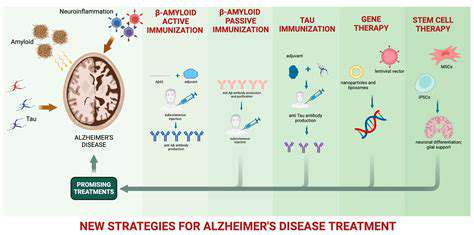
Beyond Amyloid: Novel Therapeutic Targets in Alzheimer's Disease
While amyloid has been the main focus of Alzheimer's research, recent advances show we need a broader view of the disease. Targeting amyloid alone hasn't successfully treated or prevented Alzheimer's, leading researchers to explore other potential targets. This wider approach recognizes how multiple factors - including tau tangles, inflammation, and synaptic problems - work together to drive disease progression.
This shift reflects growing understanding that Alzheimer's varies between individuals. Different people may experience different disease processes, requiring personalized approaches. Such tailored treatments could improve outcomes and reduce the disease's burden.
Neuroinflammation: A Key Player in Disease Progression
The brain's inflammatory response plays a crucial role in Alzheimer's development and progression. Chronic inflammation disrupts the brain's delicate environment, contributing to cell damage and cognitive decline. Understanding and controlling neuroinflammation is becoming an important research area for developing effective treatments.
Researchers are studying various ways to target inflammation, including identifying specific inflammatory pathways and developing drugs to safely reduce inflammation. This careful approach is needed to ensure potential treatments are both safe and effective.
Synaptic Dysfunction: The Underappreciated Culprit
The gradual loss of connections between brain cells significantly contributes to cognitive decline in Alzheimer's. This synaptic damage impairs information processing, leading to worsening memory and thinking skills. Protecting these connections and helping them regrow are important treatment goals.
Tau Protein and its Tangles: A Persistent Challenge
While amyloid gets more attention, tau protein and its tangles are equally important in Alzheimer's. Tau tangles, formed by abnormal tau accumulation, appear to contribute significantly to brain cell damage and death. Developing treatments that target tau aggregation or promote its removal is a major research focus.
Research into tau-related pathways offers new treatment possibilities. This includes identifying key molecules involved in tau pathology and developing ways to block their activity or enhance their clearance. Such work could help reduce tau's harmful effects and slow Alzheimer's progression.
The Importance of Early Diagnosis and Patient Selection
Early Diagnosis: A Crucial Step
Identifying Alzheimer's early is critical for improving treatment outcomes and research efficiency. Early detection helps focus research on those most likely to benefit from potential treatments, avoiding unnecessary costs. Reliable diagnostic tools - whether blood tests, genetic markers, or imaging - are essential for accurately identifying appropriate candidates. Early diagnosis allows faster intervention, potentially leading to better treatment responses and quality of life.
Early diagnosis also improves understanding of disease progression and underlying biology. This knowledge guides development of more targeted therapies. Researchers can identify key genetic and environmental factors, revealing important pathways and potential drug targets. This foundation supports development of more effective, personalized treatments.
Patient Selection Strategies for Maximum Efficacy
Choosing the right patients is crucial for drug development. Proper selection ensures study validity and avoids wasting resources on unlikely responders. Factors like disease stage, genetics, other health conditions, and previous treatments must be considered. Rigorous selection criteria focus research on promising candidates, increasing chances of finding effective treatments while reducing risks for inappropriate participants.
Sophisticated algorithms and data analysis can improve selection accuracy. This tailored approach helps identify treatments that work best for specific patient groups. Careful selection also reduces bias, leading to more reliable results applicable to broader populations.
Optimizing Trial Design for Successful Outcomes
Well-designed clinical trials are essential for evaluating treatments. The design must match the specific patient group identified through careful selection. This includes determining proper doses, treatment duration, and monitoring methods. Clear outcome measures are crucial for accurately assessing a drug's effects, requiring careful consideration during design.
Trial design should account for potential confounding factors, requiring deep understanding of disease mechanisms and potential treatment interactions. Proper statistical methods ensure reliable, generalizable results. This comprehensive approach addresses potential challenges and generates valuable data for drug development.
